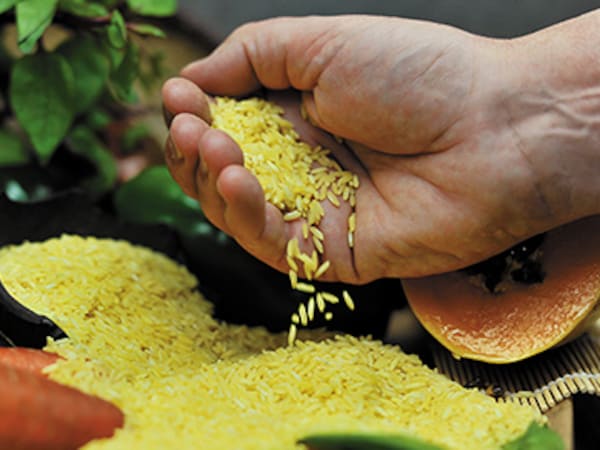Can a Hungry World Say No to GM Crops and Still Have Food Security?
The world is running low on food. Can we afford to reject GM crops out of hand?


Rice provides up to 80 percent of food calories for poor societies, but lacks micronutrients such as Vitamin A. Worldwide, every year, hundreds of thousands of children die due to a lack of Vitamin A and multiples thereof become permanently blind.
In the late ’90s, Golden Rice was developed because the inventors were concerned about food security and food quality. Through genetic engineering scientists were able to generate Golden Rice in which the intensity of colour is an indication for the level of Pro-Vitamin A. Forty gram of golden rice per day can save eyesight and the lives of more than 2 million people every year.The attempt by Greenpeace and other NGOs to block transfer and acceptance of Golden Rice is criminal because it has been proven to be completely safe. Furthermore, Golden Rice will be provided to farmers in developing countries free of costs for the trait.
In many countries GM crops are not accepted because they are thought to be unsafe for both human health and environment. However, more than 2,000 scientific papers over the last 10 years have evaluated the safety of GM crops on human health and all of them have concluded that they are as safe as crops obtained by conventional breeding. Furthermore, for the past 15 years, people in the United States have been eating GM crops and, until now, not one single negative health effect has been observed.
Another argument posed by anti-GM organisations is that growing GM crops will lead to a decrease in biodiversity. But the contrary is true: In areas where insect-resistant crops are grown, the population of non-target insects—varieties other than the ones the crops are resistant to—is much larger than in areas where conventional crops were grown. Additionally, GM technology will allow us to go back to the old varieties that were used in agriculture, but this time with added trade value, resulting in crops with higher yields or drought-resistance and other such traits.
Protestors against GM crop try to convince people that these crops are much more expensive for farmers. But if all expenses and yield gains of GM crops are taken into account, they are even less expensive than growing crops conventionally. As compared to conventional seeds, GM seeds are indeed more expensive, but their quality, as measured by their germination rate, is much higher, thus making them more cost-effective. And because GM seeds are herbicide and/or insecticide-resistant, less herbicide or insecticide is used to spray in the fields, effectively reducing the cost for the farmer insect-resistant GM crops have proven to cut insecticide sprays by more than 25 percent. GM crops also require less tillage, which reduces carbon emissions and allows for the growth of a second crop in the same season, resulting in even more yield gain for the farmer.
Finally, fewer patents are valid for farmers in developing countries.
All this together will result in an increase in global farm income of nearly 51 percent in developing countries and 49 percent in developed countries.
Ironically, the extreme opposition to genetic modification has led to hyper-regulation, which has raised the cost of bringing GM crops to market. Currently, only multinationals and large entities, public or private, can afford to comply with these rules. Small enterprises in developing countries are ultimately hurt much more than the conglomerates.
Everyone knows that climate instability will lead to storms, global warming and extreme climate variations. For the moment, we have no plants ready to survive under such extreme conditions and it is therefore important that researchers all over the world, and also in India, work on the development of stress-tolerant plants.
Activists claim that western Europe—which has shunned GM crops—is better off as compared to the US when it comes to productivity and pesticide use, but this is not true.
If you consider the global pesticide and herbicide use of the past years, indeed more of it was used but this is not due to the growth of GM crops but to the overall increase in the amount of arable land. It is proven that GM crops result in much higher yields per hectare and less pesticides and herbicide use. In order to obtain the same kind of yields for conventionally bred maize or soybean, even more land and pesticides will be needed. The effect of the refusal to grow GM crops is dramatic. Because of the absolute ban in Europe, many scientists are leaving, and with them they are taking their knowledge and technology. Europe will end up far behind on agriculture knowledge and it will find it difficult to reach the frontline again.
We are facing an enormous shortage of food.
Today, out of around 7 billion people on this planet, almost 2 billion people are hungry. By 2050, the world’s population will be 9 billion. That’s another 2 billion mouths to feed. To do so, the amount of food we produce between 2014 and 2050 must be equal to the amount grown in the last 2,013 years.
To obtain this enormous quantity of food, agricultural production as we know it today will not be enough. More arable land and water will be needed, climate changes will have an enormous impact on agriculture and changing diets of people in the western world will demand even more food.
Genetically modified crops can, however, be an answer to these increased food requirements. And society should look at the product and not at the process that made the product.
First Published: Jan 07, 2014, 06:36
Subscribe Now